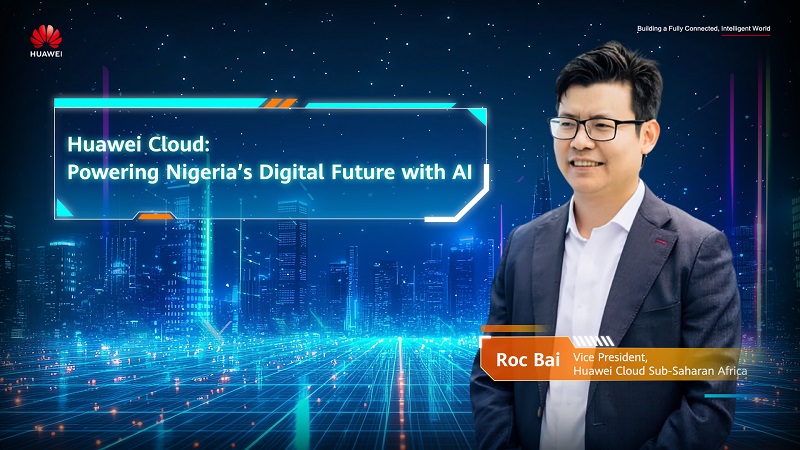Huawei Cloud recently hosted the Huawei Cloud AI4Naija Forum, themed “AI in Action: From Theory to Practice”, in Lagos, Nigeria, where several AI enthusiasts from government, finance, e-commerce, and other sectors gathered to explore the opportunities and future of artificial intelligence in Nigeria.
As one of Africa’s fastest-growing digital economies, Nigeria holds vast potential for AI adoption and innovation. Huawei Cloud showcased its latest AI products and capabilities to empower local enterprises and accelerate Nigeria’s digital transformation.
Roc Bai, Vice President of Huawei Cloud Sub-Saharan Africa, highlighted at the forum how advances in computing power and algorithmic optimisation are driving the continuous evolution of AI, noting that Huawei Cloud’s AI large models are already widely adopted across key industries—including fintech, logistics, transportation, and energy—delivering significant value to top-tier customers.
In this video, Roc talks about the potential Nigeria has for AI development, how the Huawei local cloud launched last year is benefiting local development, and the AI solutions that can support Nigeria’s digital transformation.
Speaking on Nigeria’s potential for AI development, Roc stated that as one of Africa’s largest economies, Nigeria has a large and youthful population along with a rapidly growing tech startup ecosystem, particularly active in fintech and e-commerce, providing rich scenarios and demand for AI applications.
Nigeria is actively advancing its digital transformation, building a solid digital infrastructure. Multiple stakeholders, including Huawei Cloud, are contributing to the development of local cloud computing services. Both government and private sectors place great emphasis on technology talent development. Huawei has partnered with 137 universities to train over 70,000 ICT professionals, providing strong support for AI innovation.
See also: Huawei Cloud leads dialogue on exploring AI growth in Nigeria
Nigeria’s geographic and economic position make it a regional technology hub in West Africa, with the potential to radiate influence to neighbouring countries and drive AI development and adoption across the region.
The Sub-Saharan Cloud VP also disclosed that Nigeria’s first hyperscale cloud, launched by Huawei in December last year, is a big milestone for Nigeria’s data protection goals. The local cloud keeps all data within the country, in line with the Nigeria Data Protection Commission’s requirements, which helps protect data sovereignty and ensures businesses stay compliant.
Also, the local cloud is fast — built on Tier 3+ data centres, the latency is just 15 ms, so services run smoother and more reliably. The cloud service is already helping local industries, especially fintech. For example, OPay cut its transaction latency from 130 ms to 15 ms, and a top e-commerce company improved its efficiency using Huawei Cloud solutions.
Speaking on the AI capabilities and solutions Huawei Cloud offers to support Nigeria’s digital transformation, Roc disclosed that earlier this year, Huawei launched CloudMatrix, a new cloud infrastructure built to handle the skyrocketing demand for computing power, reliability, and efficiency. CloudMatrix links and pools together resources like CPUs, NPUs, DPUs, storage, and memory. It’s a big step up from traditional single-unit setups to a flexible, matrix-style computing system. This AI-native cloud lets resources be shared, connected directly, and combined on the fly, delivering powerful AI computing tailored to what customers really need.

With the launch of CloudMatrix 384, Huawei is building an AI-native cloud infrastructure to provide powerful AI computing capabilities, and in the future, aims to bring increasingly advanced AI technologies and best practices to Nigeria.
On the security front, we have built a comprehensive 1+4+7 AI-native security framework to ensure full protection for data, models, and applications. For data processing, our GaussDB and TaurusDB databases offer self-optimisation, auto-scaling, and multi-scenario support, significantly improving data processing efficiency and intelligence.
Additionally, “our DeepSeek technology provides powerful generative AI capabilities, supporting Retrieval-Augmented Generation (RAG), intelligent agents, and semantic understanding to meet diverse business needs. AI-native technology is deployed not only in the cloud but also extended to the edge, enabling low latency and real-time intelligent responses, supporting innovative applications such as smart vehicles and virtual assistants.”
Huawei Cloud is committed to driving the transformation of enterprises from traditional on-premises architectures to cloud-native and AI-native architectures. This enables systems not only to process data but also to learn, adapt, and predict future needs.
With the launch of CloudMatrix 384, Huawei is building an AI-native cloud infrastructure to provide powerful AI computing capabilities, and in the future, aims to bring increasingly advanced AI technologies and best practices to Nigeria.
At the Forum, Huawei Cloud hosted a dedicated hands-on session on how to “build Your First AI Agent on Huawei Cloud”, drawing significant participation from technology enthusiasts and corporate representatives. Under the guidance of Huawei Cloud AI experts, participants completed the full process of creating an AI Agent from scratch within 40 minutes.









